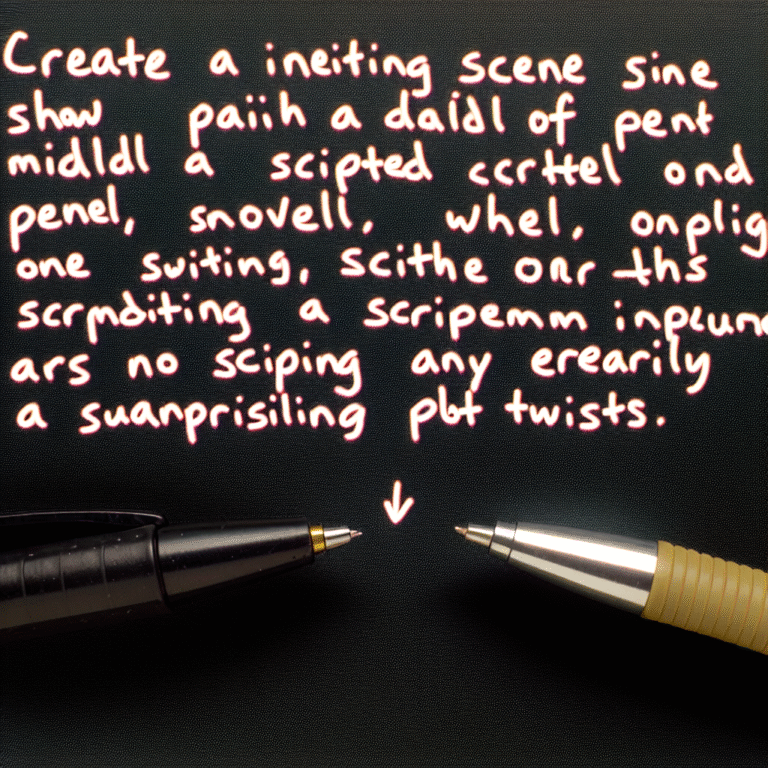Should You Stop Writing to Keep Dating Someone?
Quick Takeaways:
- Control vs. Creativity: How do you balance your creativity with a partner’s comfort?
- Understanding Boundaries: Is it reasonable for your partner to have issues with your writing?
- Love vs. Passion: Can you truly align your romantic relationship with your passion for writing?
So, picture this: you’re happily dating someone wonderful, but then the conversation takes a bit of a weird turn. You casually mention that you write erotica, and suddenly the mood shifts. Your partner looks at you like a deer caught in headlights and says, “Isn’t that cheating?” Uh, what?
This kind of conversation might make you question everything about your relationship and your passion for writing. Should you drop the pen for love? Or is it possible to keep both the romance and your writing alive? Let’s dive deep into this topic and uncover the layers.
The Balancing Act: Creativity vs. Control
When you’re navigating a new relationship, setting boundaries often feels all over the place. It’s like trying to do a tango on a tightrope—one misstep and you could tumble down either end.
Your Writings Are Your Expressions:
- Writing erotica can be seen as an extension of yourself. It’s your way of exploring fantasies, experiences, or even just creating unique characters.
- Can you imagine telling an artist to stop painting because their work might make someone uncomfortable? Nope, me neither.
Partner’s Perspective:
- On the flip side, many folks see personal writings as a serious matter—especially when it involves topics like intimacy and relationships.
- There’s a thin line between creative expression and where your partner feels safe in the relationship.
The Reality Check
Here’s the kicker: if your partner feels like your writing is a form of cheating, it’s important to dig deeper. Is it really about the writing, or is it a larger issue like trust and vulnerability?
Analyzing the ‘Cheating’ Argument
The cringe-worthy thought that your writing is akin to cheating might seem a bit radical, but it definitely deserves a closer look:
Pros of Writing Erotica While Dating:
- Creative Freedom: Engaging in creative writing can help you express feelings, fantasies, and ideas that might be hard to articulate otherwise.
- Emotional Growth: Being honest in your writing can sometimes lead to breakthroughs in understanding your own romantic and sexual desires.
Cons of Writing Erotica While Dating:
- Insecurity Sprout: If your partner feels insecure about their own desirability, they might project that fear onto your writing.
- Miscommunication: Any lack of understanding about the genre could lead to misunderstandings.
Decision-Making Checklist
So, you’re faced with a situation where you need to make a choice—keep writing or refrain? Here’s a decision-making checklist that can help you navigate this maze:
- Communication: Talk openly about why you enjoy writing erotica.
- Define Boundaries: See if you can establish what makes them uncomfortable and see if there’s a middle ground.
- Assess Intentions: Understand their reasons—it could come from personal insecurities or past experiences.
- Explore Alternatives: Could you write something different, or perhaps even collaborate?
- Evaluate Comfort Levels: What’s more important: your creative expression or nurturing the relationship?
Statistics and Real-Life Cases
Data can often put things into perspective. According to a survey conducted by The American Psychological Association, 62% of people see creative pursuits (like writing) as key to personal happiness. And yet, another study found that 47% of individuals considered certain passions “too personal” for their partners.
Comparison Table: Writing vs. Relationship Health
| Aspect | Writing Erotica | Relationship Health |
|---|---|---|
| Personal Expression | High—offers a deep dive into desires, fantasies, and emotions. | Moderate—depends on effective communication and shared values. |
| Comfort Levels | Can vary based on audience; generally viewed as self-expressive. | Relies on mutual respect and agreements about boundaries. |
| Creative Freedom | Essential for personal growth and exploration. | Needs to be nurtured but might clash with partner’s boundaries. |
| Stress Factor | May relieve stress through creativity. | Can add stress if miscommunications arise surrounding the topic. |
Navigating the Emotional Landscape
Let’s face it: relationships are a tapestry woven with emotions, fears, and desires. Here are some possible emotional implications of writing erotica while dating:
- Jealousy: Your partner might feel jealous knowing you’re exploring intimate scenarios with others (even if fictional!).
- Fear: They may worry that your writing reflects dissatisfaction with them or the relationship.
- Desire for Control: Sometimes a partner wishes to control what their significant other engages in, creating a power struggle.
Acknowledging Boundaries Without Sacrifice
Healthy relationships are built on understanding and compromise. Should you or your partner feel stifled by certain aspects of life? Here are some ways you can strike a balance:
Mutually Agree on Comfort Levels: If writing is important to you, how can you create space for it without jeopardizing the relationship?
Include Your Partner: Can they read your work? Would this bring transparency to your creative process?
Create Safe Words or Triggers: Establish words that feel safe communicating with each other when discussing sensitive topics.
The Future of Your Writing and Relationship
Relationships evolve. Your writing will, too! There’s a great chance that if both you and your partner aren’t on the same creative page now, you might eventually find common ground:
Workshops or Classes: Consider taking a couples writing class together; it might ease tensions while you both share your perspectives.
Create Distinct Fiction Spaces: Perhaps you could carve out private writing sessions where your partner knows you’re pursuing your passion while also setting aside quality time for them.
Reassess Every Few Months: Relationships are like gardens; they need regular tending. Every few months, check in with each other about writing and comfort levels.
Navigating the Feelings of Your Partner
Here’s where the rights of personal expression meet emotional investment. What do you do when a partner feels uncomfortable with your creativity? It boils down to emotional intelligence.
Validate Feelings: Listen to their concerns without dismissing them. It’s particularly crucial because that fear may tap into deeper insecurities.
Be Honest: Let them know why you write—how it fulfills you, provides sanctuary and serves as a creative escape.
Include Them: Share parts of your work—let them in on your world; transparency could build trust around your writing.
Finding Your Own Voice
When faced with a dilemma about what’s acceptable versus what’s not in a relationship, it’s important to remember—you still deserve to express yourself. This doesn’t mean disregarding your partner’s feelings; rather, it’s about navigating your creative outlet while keeping emotional health at the forefront.
Writers, just like artists, live and thrive on expression. If you snuff that out, what’s left? A hollow shell of a person, and trust me, nobody wants that.
Conclusion: The Heart of the Matter
When it comes to relationships, life is all about compromise and understanding. If your partner feels that your writing is akin to infidelity, it’s game time. Engage in an open dialogue, talk about boundaries, and if necessary, re-evaluate what you are willing to sacrifice for love.
Ultimately, the answer to whether you should stop writing erotica or not will vary from relationship to relationship and person to person. Just as love requires nurturing, so does passion! Will there always be friction? Sure, but it’s how you manage that friction that defines the health of your relationship.
So, do you drop the writing for romance? Well, that’s something only you can decide! But remember, a healthy relationship encourages personal growth every step of the way.
Keywords: writing, erotica, dating, communication, boundaries, relationship, creativity, jealousy, emotional intelligence, compromise.






